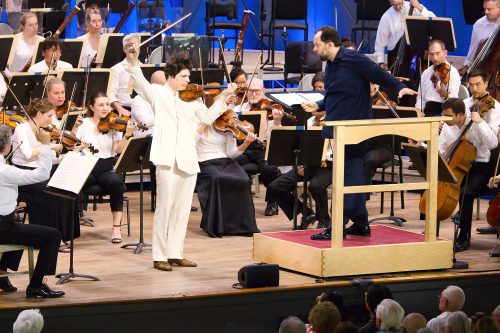Two concertos are the highlights of the Tanglewood Competition’s second weekend – Seen and Heard Worldwide
 United States Tanglewood Competition 2024 [3] – Varied: Soloists, Boston Symphony Orchestra / Andris Nelsons (conductor). Koussevitzky Shed, Lenox, Massachusetts, 13 and 14.7.2024. (ES-S)
United States Tanglewood Competition 2024 [3] – Varied: Soloists, Boston Symphony Orchestra / Andris Nelsons (conductor). Koussevitzky Shed, Lenox, Massachusetts, 13 and 14.7.2024. (ES-S)

[1] Simon, Beethoven, Ellington: Yuja Wang (piano), 13.7.2024.
Carlos Simon – ‘Heat from Different Suns’ for string orchestra
Beethoven – Piano Concerto No.4 in G main
Encores: Mendelssohn, Songs With out Phrases Op.67, No.2; Prokofiev, Piano Sonata No.7 in B-flat main, third motion
Ellington – Three Black Kings, Harlem (A Tone Parallel to Harlem)
[2] Kirkland Snider, Prokofiev, Dvořák: Augustin Hadelich (violin), 14.7.2024.
Sarah Kirkland Snider – ‘Ahead into Mild’
Prokofiev – Violin Concerto No.2 in G minor
Encore: ‘Orange Blossom Particular’ (arr. Hadelich)
Dvořák – Symphony No.7 in D minor
Tanglewood performances on Saturday and Sunday, led by Boston Symphony Orchestra’s music director, Andris Nelsons, offered equally structured first halves that includes concertante items with well-known soloists. Previous these have been lately composed works looking for better recognition.
The second halves, nevertheless, diverged considerably. A proficient, although not excellent, rendition of Dvořák’s Symphony No.7 sounded very Brahmsian in its structural complexity, improvement of thematic materials and darkish orchestration. Nelsons meticulously dealt with particulars, seamlessly integrating soloistic passages into the musical cloth and elegantly managing intricate rhythmic patterns, such because the overlay of a furiant dance and a waltz within the Scherzo.
On the earlier night time, the second a part of the live performance was fully devoted to the music of Duke Ellington, orchestrated by Luther Henderson. Impressed by a Sunday stroll, Harlem (A Tone Parallel to Harlem) represents a collection of reminiscences in regards to the New York neighborhood, its road scenes and its well-known or just picturesque characters. Three Black Kings additionally seeks to narratively join the current with the previous. A gospel-like homage to Martin Luther King is preceded by two sections that evoke Biblical characters: Balthasar, one of many Three Magi and King Solomon. Within the phase devoted to the previous, a percussive, energetic drive anchored by conga drums is permeated by lush, Hollywoodian-Oriental mixtures of strings and winds. Within the latter, candy strings and trumpets body a cabaret-like scene that includes charming solo winds.
These orchestral transpositions have been notable of their use of classical devices just like the harp to boost the jazzy colours and rhythms. Total, nevertheless, using such a big orchestra for this music appeared extreme – a extra intimate band would have higher highlighted its qualities. Nelsons and his ensemble did their finest to adapt to the jazzy model and its distinct levels of freedom in comparison with classical music. They appeared a tad uncomfortable at occasions, however that was to be anticipated.
Carlos Simon’s ‘Heat from Different Suns’ is an growth for string orchestra of a string quartet initially composed in 2019. The title is impressed by Isabel Wilkerson’s e book which describes the tribulations of African Individuals in the course of the ‘Nice Migration’ – a several-decades-long interval when tens of millions moved from rural and impoverished Southern areas to city areas within the North and West.’
The work is split into three actions – ‘Rays of Mild’, ‘Flight’, ‘Settle’ – linked by a persistent ‘agitation’ theme, famous by the composer in his prefatory remarks. Together with improvisatory parts typical of jazz and blues, together with echoes of Copland’s strategy to musical colours, the rating might reveal a richness that exceeds preliminary impressions. Nelsons gave his customary ‘attention-to-detail’ therapy to the violin divisi and chromatic inflections.
Sarah Kirkland Snider’s ‘Ahead into Mild’, titled after a suffrage slogan, was commissioned by the New York Philharmonic as a part of ‘Challenge 19’ which invited nineteen ladies composers to have fun the centennial of the ratification of the Nineteenth Modification, granting American ladies the precise to vote. The composer describes the work as ‘a meditation on perseverance, bravery and alliance’. Nonetheless, any programmatic connotations within the fantastically orchestrated rating are troublesome to discern with out prior clarification. The sonorities are clearly trendy but not dogmatically so, as gently launched waves intersect and overlap in a luminous soundscape. Coloristic nuances are sometimes wealthy, although usually simply delicately prompt. The instrumentalists appear to get pleasure from taking part in music that’s neither tough nor overly sentimental, but deeply significant.

Nelsons as soon as once more demonstrated his present as an accompanist in these performances, with the presence of two magnificent younger-generation soloists serving to focus on his expertise even additional. Augustin Hadelich commanded the highlight in Prokofiev’s Violin Concerto No.2, famend for its daunting technical challenges. He effortlessly navigated passages of immense issue, whereas infusing them with each anticipated mischievousness and sudden lyricism. Within the slower segments, his dialogues, not solely with the orchestra but in addition with the Koussevitzky Shed birds, have been marked by heartfelt magnificence. The mysterious solo introduction unfolded just like the opening sentence of a charming ghost story, whereas the melody within the Andante assai soared gracefully above the pizzicato strings and woodwinds.
The tilting of Yuja Wang’s repertoire stability in the direction of colourful, showy, ‘Rachmaninovian’ exploits usually hides the poetic, dreamlike and considerate points of her taking part in. At Tanglewood, her rendition of Beethoven’s Piano Concerto No.4 was splendid. Within the famed introductory bars, the piano grabbed consideration with a tentative reasonably than assertive assertion. Any fireworks appeared bathed in moonlight. Wang approached the gloomy Andante con moto with modesty, permitting the piano to delicately weave its dialogue with the orchestral ‘furies’. Her micro-control of dynamics was constantly astonishing. The principle theme of the ultimate Rondo emerged shy and playful, by no means reaching bellicose dimensions.
Enthusiastically applauded, Wang supplied two encores, every highlighting completely different points of her advanced musical persona. Mendelssohn’s Op.67 No.2 from the Lieder ohne Worte cycle was filled with longing, regardless of its Allegro leggiero marking, whereas the third motion of Prokofiev’s Sonata No.7 sounded as if a long-caged satan was lastly launched.
The proposed program for her forthcoming recital at Tanglewood, linking Shostakovich’s preludes and fugues with Chopin’s ballades by way of Barber’s Sonata, guarantees a efficiency that can as soon as once more show to disbelievers that there’s vital interpretative depth beneath Yuja Wang’s sparkles.
Edward Sava-Segal
